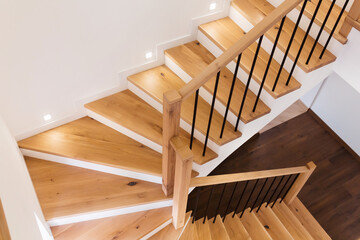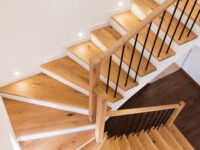Choosing Custom Stairs for Your Home

A custom staircase can make a huge difference in your home’s overall look and feel. It can also increase your property value and attract potential buyers. They are crafted from various wood species and are made to match the rest of the woodwork in your home. Popular woods include exotic Brazilian Cherry, rich African Mahogany and wavy-textured Cumaru.
 Custom stairs are a significant design element of any home or building project that involves a second floor. They must serve both functional and aesthetic purposes, and they need to fit within your space. Straight Stairs are the most common type of custom stairs for both residential and commercial properties, but they can be customized in many ways to provide an interesting architectural feature. They can also be curved to add a flared appearance.
Custom stairs are a significant design element of any home or building project that involves a second floor. They must serve both functional and aesthetic purposes, and they need to fit within your space. Straight Stairs are the most common type of custom stairs for both residential and commercial properties, but they can be customized in many ways to provide an interesting architectural feature. They can also be curved to add a flared appearance.
These stairs are a little easier to install than spiral or winder custom staircases, as they require only center support and no need for a landing or handrails on the steps. They can be a great choice for homes with children and young families or apartments where there is limited space.
They are also popular in beach front decks and city lofts where space is at a premium. However, they can be difficult to navigate and do not always meet building codes for secondary egress. Circular custom stairs, or helix stairs, are another unique type of staircase that can be fabricated with a mix of metal and wood components. They are available in large outer diameters and small inner diameters, with some models able to be used for primary egress.
Choosing a curved custom staircase can be an important decision in the design of your home. Curved stairs solve the problem of unconventional landing platforms, while adding elegance and sophistication to any space. They also provide a unique opportunity to showcase your personality and style with grand winding staircases that are sure to be a conversation starter in any room. From stair tread, handrail and newel post options to species of wood, different design decisions can give your staircase a distinct look that fits your taste perfectly.
A curved staircase also has the advantage of being easier to navigate than straight stairs, due to their consistent symmetrical flow and cadence. This allows for a comfortable and user-friendly experience when climbing or descending, even in the event of an emergency.
Modern design often features natural light, which gives a stunning glow to curved stairs. The metal and steel framework used to create a curved stair frame is often polished, allowing the shine to catch the light and illuminate the steps, enhancing the ambiance of the space.
The curved design of a stair can be accentuated with a variety of railing styles, including those made of stainless steel. This material is easy to clean and provides a shiny finish, perfect for modern homes.
L-Shape custom stairs are a great option for homeowners who prefer a more visually interesting design, or for those who want to add visual drama to their home. They take up less space than straight or curved stairs, and they can be placed in the corner of a room for added flexibility in your floor plan.
L shaped custom stairs typically have two stair flights that connect at a landing or by winder treads that create a 90deg turn. This style is most commonly used when space is limited and a full straight flight cannot fit.
These can be easier to fit into an architectural plan than straight or curved stairs, since the landing(s) provide a resting point partway up the stairs. They also offer a visual barrier between floors to add privacy, and they can help with sound transmission between floors if the stairs are contained within walls.
This type of stair is usually installed in larger entryways to maximize usable floor space. It is also easier to install and more affordable than a double-sided staircase. Custom stairs can be made from various materials, including wood, metal, glass, or stone. Consider the style of your home and the durability and maintenance requirements of each material.
Custom stairs can be designed in various styles, including straight, curved, or spiral. Custom stairs can feature different treads and risers, including open, closed, or floating treads. Consider the safety and functionality of each option. Consider the space available and the aesthetic you are trying to achieve.





